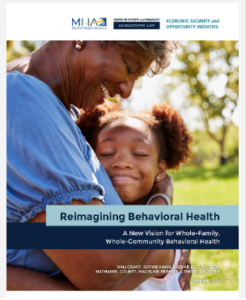
There’s a troubling trend happening in the United States. Mental health problems are worsening, despite landmark policy victories in coverage for mental health services.
From 2011 to 2015, adolescent psychiatric emergency department use increased by 54%, with some of the largest increases among African American and Hispanic teens who face the greatest discrimination and need. We need a policy framework to solve the complex challenges to providing comprehensive mental health care to those who need it most.
Fortunately, decades of advocacy have given us a solid foundation to build upon. The Mental Health Parity and Addiction Equity Act of 2009 and subsequent statutes prohibited health insurers from restricting mental health and substance misuse benefits more than they restrict other health benefits — a historic win for the rights of individuals and an important step toward healing from a long legacy of discrimination. At first the act motivated only surface-level change in benefit design, but now over a decade later, compliance appears to be slowly (perhaps very slowly) improving. The recent victory in the Wit v. United Behavioral Health case, which found that cost-based medical necessity criteria for mental health and substance use coverage violated parity when clinically-based criteria were used for other health conditions, demonstrates that there are some real possibilities for change as a result of implementation.
Despite such progress, mental health is worsening over time by several metrics, including suicide rates and rates of adolescent depression and anxiety. No single explanation has emerged from research. Likely the answer lies in a complex interaction of changing socioeconomics, technology, politics, and awareness. It may be a decade before we are able to untangle the threads and really understand the problem, but the children growing up today and their families need action now that is both pragmatic and visionary, that builds on what works while seeking to change the paradigm. We also need to recognize the bidirectional relationship between mental health equity and socioeconomic mobility — that poverty exacerbates mental health problems and mental health problems exacerbate poverty — and we need to center economic justice in our approach to be effective in driving change.
A new report that Mental Health America co-produced with the Georgetown Center on Poverty and Inequality, with funding from Kaiser Permanente, begins to lay out such a plan.
 Reimagining Behavioral Health: A New Vision for Whole-Family, Whole-Community Behavioral Health synthesizes findings from dozens of policy experts across sectors and published evidence from across disciplines to propose an agenda for policy reform that would lead to meaningful, population-level improvements in the behavioral health of low-income children and families.
Reimagining Behavioral Health: A New Vision for Whole-Family, Whole-Community Behavioral Health synthesizes findings from dozens of policy experts across sectors and published evidence from across disciplines to propose an agenda for policy reform that would lead to meaningful, population-level improvements in the behavioral health of low-income children and families.
The recommendations start with those that are more incremental and reactive but nonetheless necessary, move to those that continue to advance our solid foundation of progress in parity and other areas, and finally offer credible policy approaches to tackling some of the most complex technological, social, political, and economic issues driving behavioral health problems for low-income families. The recommendations engage almost every sector imaginable — from health care to education to urban planning — in being part of a positive change and focus particularly on those populations who are often glossed over in policy recommendations, such as sexual, cultural, or linguistic minorities. We hope that these recommendations can catalyze immediate action while serving as a guide for policy-making for years to come.
At Mental Health America, we immediately began to translate our findings into action. The report informed our advocacy with Senator Capito and Senator Durbin’s Resilience Investment, Support, and Expansion (RISE) from Trauma Act, and gave us direction for several other legislative proposals under development. In collaboration with the dozens of other national organizations from all different sectors who lent their expertise to the report, we hope that many of the recommendations will become law. Mental health and its inextricable link to economic justice can be addressed through policy, and the need for the kinds of changes outlined in the report has never been more critical.
